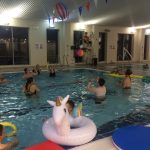Jayne Caudwell (Department of Events & Leisure) and Carly Stewart (Department of Sport & Physical Activity) were successful in the last round of the British Academy Small Grants Scheme. Their research project will contribute preliminary qualitative research findings to inform future provision for transgender and non-binary swim-related activities and opportunities.
Statistics demonstrate that LGBT+ have higher levels of anxiety, depression, and suicidal feelings as a consequence of feeling isolated, and experiences of rejection and bullying. The research project involves a Bournemouth-based transgender group. It focuses on their swim-related activities to explore the benefits of water-based physical activity. Currently, the group privately hires a local pool and by invitation the researchers have attended on three occasions. Preliminary participant observation has identified that group members look forward to the opportunity to swim. Swimming as a form of physical activity can enhance subjective wellbeing. However, there is evidence in the tabloid print media that public response to Swim England’s ‘Guide to Engaging Trans People in Swimming’ (December 2017) involved elements of transphobia. Specifically, a negative reaction to transgender women using female changing rooms. The funded project will provide in-depth research findings in order to influence current policy-formation.
LGBT+ experiences of sport, physical activity and embodied movement continue to be significant concerns given the barriers, constraints, prejudice and discrimination evident within institutionalised sport and physical activity. Since the 1990s sport and leisure studies scholars have documented lesbian and gay peoples’ experiences of participation. This research has helped improve opportunities for lesbian and gay people to participate by raising awareness and increased inclusion and provision. More recently, there has been a turn to transgender participants and issues surrounding the often-constraining binary arrangement and organisation of sport and physical activity. This turn is important because it highlights the different hostilities transgender and non-binary individuals face compared with lesbian and gay participants. However, the focus of this emerging research—transgender and non-binary participation—tends to be competitive sport and the structures that regulate and confirm binary-sex and gender. Less is known about grassroots participation, and/or the new/emerging opportunities and bodily pleasures transgender and non-binary individuals and communities create for themselves and for each other.
There are a small number of transgender and gender non-conforming swim groups in the UK, but there is no current research that captures transgender and non-binary experiences of swim-related activities such as negotiating access to pool time, negotiating access to changing facilities, and the thoughts, feelings and embodied experiences regarding being in the water. As such, the now-funded research is underpinned by the following objectives:
1. To work with a local transgender group to collect, process and disseminate qualitative research findings on how access to swimming facilities impacts individual and group wellbeing.
2. To explore past and present experiences of swimming for transgender and non-binary participants through interviews and focus group research.
3. To access details related to embodied experiences, which might not emerge from traditional methods such as interviews and focus groups, through visual methods such as drawings, photographs, video diaries and digital story telling.
4. To produce, for public consumption, a visual/art representation of the research participants’ experiences of swimming.
 Photo of the week ‘Safe swim: Supporting physical activity and well being for transgender young people’
Photo of the week ‘Safe swim: Supporting physical activity and well being for transgender young people’










 BU attendance at third annual GCPHR meeting in June
BU attendance at third annual GCPHR meeting in June Interactive Tangible and Intangible Heritage Applications – BU student work featured in new book chapter
Interactive Tangible and Intangible Heritage Applications – BU student work featured in new book chapter Second NIHR MIHERC meeting in Bournemouth this week
Second NIHR MIHERC meeting in Bournemouth this week MSCA Postdoctoral Fellowships 2025 Call
MSCA Postdoctoral Fellowships 2025 Call ERC Advanced Grant 2025 Webinar
ERC Advanced Grant 2025 Webinar Horizon Europe Work Programme 2025 Published
Horizon Europe Work Programme 2025 Published Horizon Europe 2025 Work Programme pre-Published
Horizon Europe 2025 Work Programme pre-Published Update on UKRO services
Update on UKRO services European research project exploring use of ‘virtual twins’ to better manage metabolic associated fatty liver disease
European research project exploring use of ‘virtual twins’ to better manage metabolic associated fatty liver disease